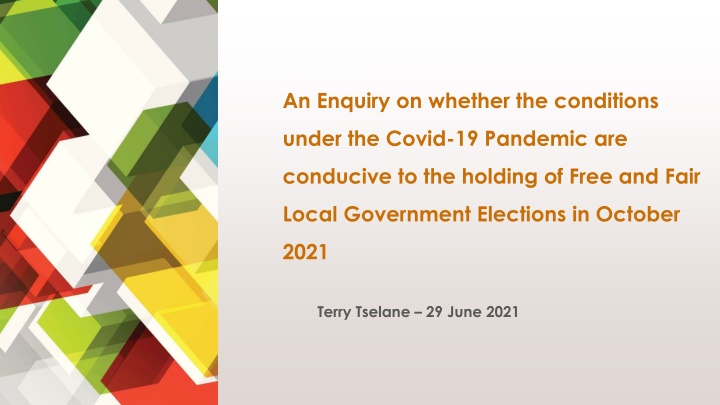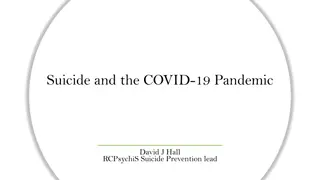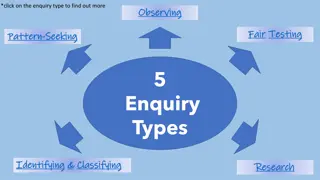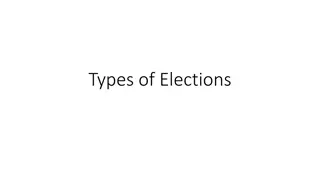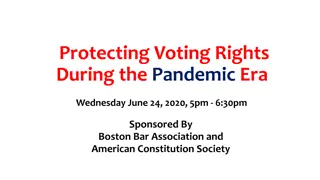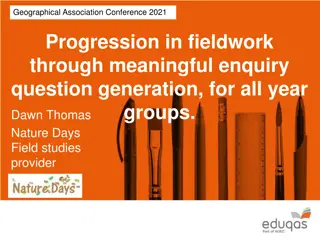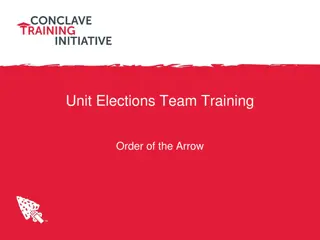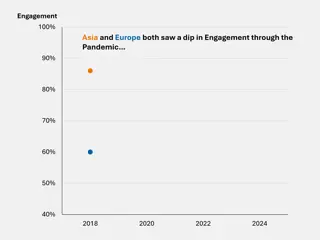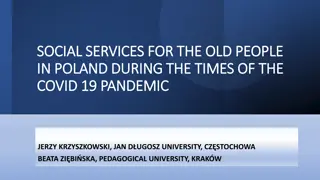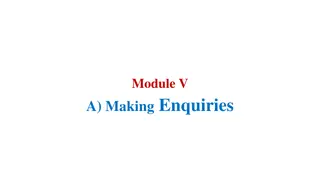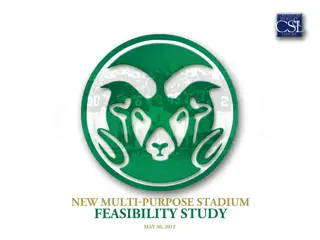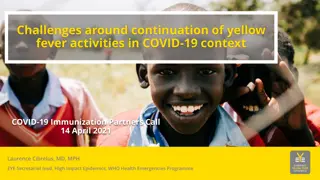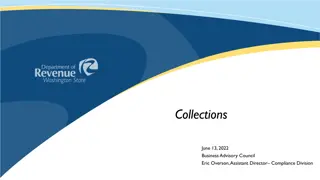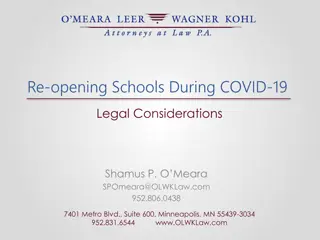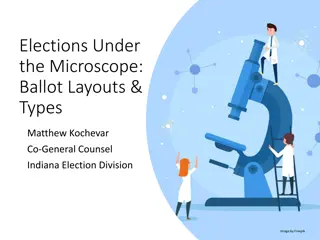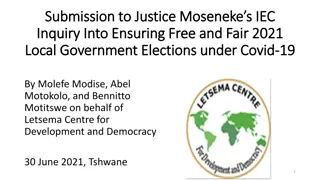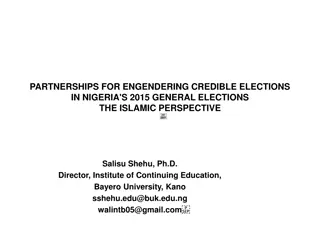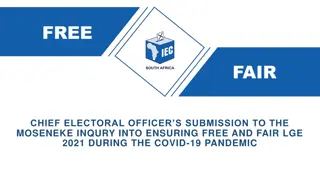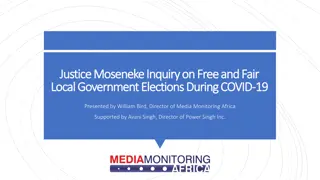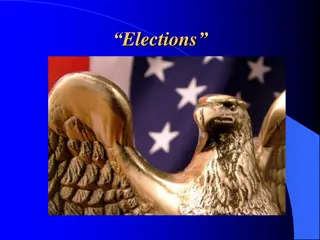Enquiry on Feasibility of Local Government Elections Amid Covid-19 Pandemic
The Electoral Commission's inquiry on the feasibility of holding free and fair local government elections in October 2021 amidst the challenges posed by the Covid-19 pandemic is crucial. The impact of the pandemic on voter registration, election fairness, and the legitimacy of election results is highlighted through court cases' analyses. The need for ensuring voter safety, fairness, and credibility in the electoral process is emphasized.
Download Presentation

Please find below an Image/Link to download the presentation.
The content on the website is provided AS IS for your information and personal use only. It may not be sold, licensed, or shared on other websites without obtaining consent from the author.If you encounter any issues during the download, it is possible that the publisher has removed the file from their server.
You are allowed to download the files provided on this website for personal or commercial use, subject to the condition that they are used lawfully. All files are the property of their respective owners.
The content on the website is provided AS IS for your information and personal use only. It may not be sold, licensed, or shared on other websites without obtaining consent from the author.
E N D
Presentation Transcript
An Enquiry on whether the conditions under the Covid-19 Pandemic are conducive to the holding of Free and Fair Local Government Elections in October 2021 Terry Tselane 29 June 2021
Introduction The step taken by the Electoral Commission to initiate this enquiry is commendable The country is in the middle of a pandemic The restrictions imposed on gatherings will further affect preparations for elections The Covid-19 infection rates and deaths have skyrocketed The majority of people who are vulnerable to infection fall within the category of voters No country in the world has banned gatherings and proceeded to hold elections
What constitutes Free and Fair Elections This is what the Constitutional Court said about the notion of Free and Fair Elections Whether any election can be so characterized must always be assessed in context . Ultimately it involves a value judgement. The following elements can be distilled as being of fundamental importance to the conduct of free and fair elections. First, every person who is entitled to vote should, if possible, be registered to do so. Second, no one who is not entitled to vote should be permitted to do so. Third, insofar as elections have a territorial component, as is the case with municipal elections where candidates are in the first instance elected to represent particular wards, the registration of voters must be undertaken in such a way as to ensure that only voters in that particular area (ward) are registered and permitted to vote. Fourth, the Constitution projects not only the act of voting and the outcome of elections as a candidate and to seek public office.
What constitutes Free and Fair Elections cont In the matter between the Electoral Commission and Aaron Paseka Mhlope and others, this is what the Constitutional Court said: The mere existence of the right to vote without proper arrangements for its effective exercise does nothing for a democracy; it is both empty and useless. The right to free and fair elections underlines the importance of the exercise of the right to vote. The requirement that every election should be fair has implications for the way in which the right to vote can be given more substantive content and legitimately exercised. There are important constitutional considerations relevant to the design of an electoral system which include the need to ensure that the election process will be free and fair and that the results will be both credible and accurate.
What constitutes Free and Fair Elections cont In a matter of Njabuliso Robert Mvelase and the African National Congress and others, the Electoral Court found that failure by a voter to exercise a vote because of fear and intimidation can affect a legitimacy of an election. The Imbabazane election results in Ward 3 were as a result nullified. The appellants have provided sworn evidence that a number of prospective voters did not exercise their right to vote essentially out of fear of being assaulted or intimidated. Indeed, the majority of them were intimidated by what they saw near the respective polling stations and by what they had heard. There are more than thirty-five deponents who declared that they would have voted for the second appellant in that particular election. Such allegations of assaults, intimidation, threats and declared intentions are undisputed.
IEMSAs INTEGRITY WHEEL
IEMSAs INTEGRITY WHEEL 1. Political Environment : Appointment process of election management services and election officials Intra-party relations Election Environment Information Dissemination to the electorate Role of the Media Role of State Organs and Incumbency 2. Legal Framework : Constitutional Framework Electoral Legislation and Regulations Management of Inter-party Relations Registration of Political Parties Funding & Finances of Political Parties and Candidates
IEMSAs INTEGRITY WHEEL cont 3. Voters Roll : Demarcation and Delimitation Process Voter Registration Process Voter Eligibility Currency of the Voters Roll Communication Plan 4. Human Capital : Recruitment Process Training Interventions Development Plan Code of Conduct Impartiality
IEMSAs INTEGRITY WHEEL cont 5. Logistics : Project Management Procurement of electoral material Distribution of electoral material Management of the Voting Process Financial & Risk Management Storage and warehousing of electoral material
Electoral Commissions Role Constitutional Framework In terms of Section 190 of the Constitution of the Republic of South Africa, 1996, the electoral elections commission s role is to; Manage elections of National, Provincial and Municipal legislative bodies; Ensure that those elections are free and fair; Declare the results of those elections; and Compile and maintain a voters' roll. The Electoral Commission has an obligation to ensure free and fair elections; Free and fair election are, therefore, fundamental in the role of the electoral commission and not accidental to its core functions and mandates All these three functions are equally important, and none should be elevated above the other. The fundamental question is whether the commission has satisfied an obligation of an ensuring free and fair elections in its preparations for the 2021 Municipal elections. It is common cause that the commission has admitted that currently conditions are unfavorable for free and fair elections.
Electoral Commissions Role cont In a matter of the New National Party v Government of Republic of South Africa and Others, A prevailing circumstance of some importance is that all people who had a genuine desire to vote would have had to cast their ballot in favour of one or other political party. It must be borne in mind that the responsibility of ensuring that people know of the requirements for voting is not only that of the government. Indispensable to any democratic process is that political parties will ensure that their potential supporters are aware of the prerequisites of voting and comply with them.
What is the current context? The country is in the middle of a pandemic Gatherings have been banned Political Parties are not able to do their political work as a result. Citizen s rights to interact with candidates and Political parties has been limited. There is real fear and anxiety about this pandemic. The Commission does not have the resources to conduct two Registration Weekends. Registration weekend is a key driver of election milestones and election timetable.
Postponing Elections The legislation anticipates moments when election can be postponed. Even though the legislation says this must happen within 90-day period, it does not exclude a possibility of having elections outside this period. There is a precedent where the recent by-elections took place outside a 90 period. There is no evidence that postponing the election will harm the state of our democracy or offend the Constitution.
Way Forward Consider postponing the elections to May 2022 The IEC staff and temporary electoral staff should be prioritized for vaccination ICASA must be drawn in to help political parties to put their messages across to the electorate Community Radio stations should be supported to help with the interaction between candidates, Political Parties and the Electorate Prioritise vaccination of the vulnerable groups (the voting population)within the society Consider postponing the registration earmarked for the weekend of the 17 & 18 July 2021.
